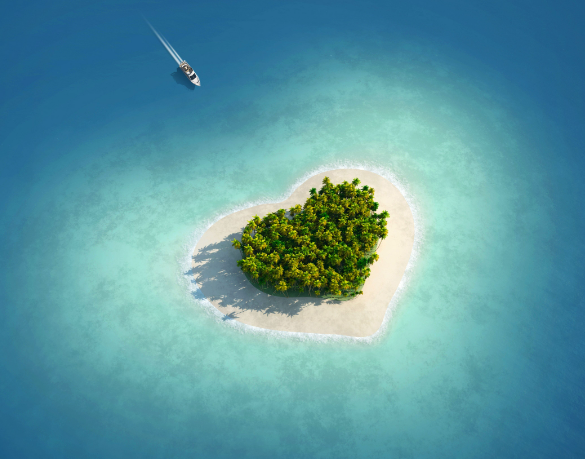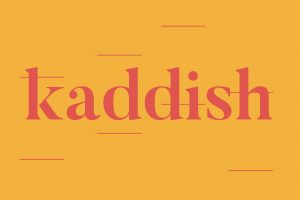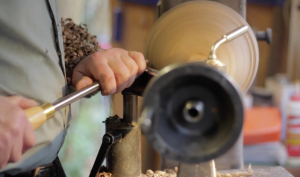The mastery of Love Island
by Manon Formaggia | June 11, 2024

It was Monday 3rd June, half past ten. The girls were all in their pyjamas with cups of tea in hand. Biscuits and stale popcorn were sprawled across a makeshift table. Layla’s single bed had been pushed up against the wall. An individual spinny chair had been ripped away from her desk and transformed into a front row seat. A self-inflating camping mat was on the floor to maximise viewership. The computer monitor’s screen brandished Maya Jama. The ‘Watch Now’ button was ready to be clicked.
I love Love Island. What began as a more cynical and ironic affection has slowly grown into a heartfelt passion over the past six years. This love is well-known among my friends and family. This year, I woke up to celebratory texts from friends wishing me a ‘Happy Love Island Day,’ complete with bikini, sun and palm tree emojis. It also marked the day when my fellow Love Island-fanatic friends created and added me to their annual Love Island-specific private stories. I, ritualistically, redownloaded Twitter (or X, I guess) and refollowed a slew of Love Island meme accounts on my finstagram. After a week of watching teaser videos on YouTube, I was more than ready to eat it.
The programme was first introduced to me in 2018 by my older brother. My super cool, older brother, renowned for his impeccable taste in television and film. Naturally, my teenage self followed Elias’ lead in everything, including his TV preferences. Every evening, we sat down together for an hour to watch the unforgettable season four. It was a season that brought us Danny Dyer’s daughter, Dani Dyer, Dr Alex George, the ever-loyal Georgia Steele and the most notorious Adam Collard. This very same year, my school got the Love Island bug. Everyone was watching it. Bitching about it. Moaning about it. Delighting in it. Enduring it. Hating it. Loving it. In the world of conversation, if you didn’t watch it, you just didn’t really exist. Love Island tolerance was a bare minimum to partake in my school’s social sphere from June until the end of the school year.
Since my initial foray with the show, I have watched every single season of Love Island UK, including both Winter Love Island editions. I’ve also branched out internationally, watching every season of Love Island Australia and highlights of Love Island France. I have yet to muster up the courage to start attacking the five seasons of Love Island USA, but I do not doubt that postgrad life will provide me with the time and opportunity to do so.
For a show coming up to its tenth anniversary, I have to appreciate its mastery for staying alive for so long alongside my own fervent love. Each year, shows that have held important stakes in British culture continue to be slashed. In 2018, The X-Factor, undoubtedly a defining feature of 2000s British reality television, aired its very last series. It was only this year that we saw Big Brother return to our screens after a five-year hiatus. And so, it’s pretty impressive that Love Island gets renewed each year without question. The producers are certainly doing something right.
It is the show’s sustained dedication to being so intentionally ‘low-brow’ that is the source of its brilliance. Love Island embraces the gaudy and the tasteless. The villa itself is so artificial that it becomes oddly endearing. Adorned with bright orange bed sheets, lurid blue walls, a plethora of fake plants and LEDs, the villa is crowned with the legendary heart-shaped archway at the entrance. Each element is so remarkably harsh that they start to collectively blend, muting one another through their competition for loudness. The personalised water bottles and suitcases, embellished with vivid neon, Pinterest-Mum-calligraphy of the Islanders’ names, are not just classic, ye olde staples of the show, but highly sought-after possessions.
The opening credits remain undyingly faithful to the original season, featuring the iconic golden-glitter heart and its unmistakable heavy-beat jingle. Iain Stirling annually serves as the show’s Scottish mosquito buzzing in your ear, incessantly delivering unfunny jokes, occasionally sprinkled with the odd football reference to appease the ‘reluctant’ boyfriends who have been ‘begrudgingly’ roped into watching the show (they secretly love it). Generic acoustic guitar covers are played whenever anything emotional happens. You just can’t top it.
In the best way possible, the show is blatantly formulaic. The unchanging typecasting each year is actually incredible at this point. Variations of the same person return annually with the same work done and the same type: tall, dark and handsome, don’t you know? The diverse range of regional accents adds a vibrant energy to the show, where we can expect to see a South London Roadman meeting a Welsh Valley Girl, and a Home County Princess (I see you, Harriet) encountering a Yorkshire Lad, Lad, Lad. Of course, the show’s famous linguistic repertoire is exquisite, featuring terms like ‘the ick,’ ‘pied,’ ‘grafting,’ ‘mugged off,’ ‘cracking on,’ and ‘melt.’ These are accompanied by euphemisms like going to the salon, undertaking your NVQs or scoring a goal to describe the stages of a ‘get with.’ The crowning glory of season four was becoming a member of the ‘Do Bits Society’ (DBS), not to be confused with that certification you need for working with kids.
Love Island revels in second-hand embarrassment and lives for the cringe. It magnifies awkward first dates, painfully bad chat and uncomfortable rejections, creating a world of agonising social moments that are irresistibly entertaining. This is the show that brought us ‘Fanny-flutters’ Maura, ‘Ughh, Tommy’ Molly-Mae and ‘It’s giving’ Whitney. A culture of iconic references has emerged from the show’s epic moments, such as Ekin-Su crawling across the balcony to steal a kiss with Jay, unbeknownst to her Italian Stallion Davide, and Andrew awkwardly sitting Tasha down to clarify that he didn’t really cheat, he just ‘licked her tit or whatever.’
The ‘challenges’ the Islanders undertake are outright, full-blown strip teases and provide shameless opportunities for them to snog someone outside their ‘couple’. The novelty of getting to visit the hideaway for the night — a private room for alone time (WINK WINK and WINK again) — demonstrates the show’s brazen nature. Casa Amor replicates the ultimate lads’ and girls’ holiday, cultivating the perfect environment for infidelity. The show maximises heterosexuality, blowing it up to the extreme. Love Island is unapologetic. It is hyper-aware. The subtext of romantic life becomes text and that text becomes a giant pink neon sign that says ‘What’s your chat?’.
The audience’s engagement with the show shapes it to become truly phenomenal. Naturally, during the ITV ad breaks, your phone becomes the go-to entertainment. Love Island Twitter memes showcase social media at its funniest and most creative. Year after year, the memes grow richer with layered references and screenshots of historic show moments, requiring deep fan knowledge to fully appreciate them. Famous meme formats swirl around, with the ‘Destiny’s Chaldish’ meme reappearing annually as Casa Amor misfits join the ranks of cheats. Season three’s Chris Hughes consistently makes the rounds on Twitter, with his iconic moments of lying wide awake in bed, offering to rap ‘to lift the mood,’ and telling seated Olivia Attwood to ‘sit back down’ during an argument. If the Twitter memes aren’t enough, you can also dive into the Love Island phone game — similar to Episode (the girls that get it, get it) — to pass the time during ad breaks or shop for your personalised Love Island water bottle, of course.
When I broach my unironic obsession with this show, many people often find it pretty strange. I’m unsure if it’s because I go to Oxford or because I come across as romantically reserved or because it doesn’t align with my usual feminist views. Recently, I’ve started to think they find it odd because I feel no shame in watching, enjoying and talking about it. Many refer to watching reality TV shows as their ‘guilty pleasure.’ While I suppose that’s the box I’m in, I feel no guilt — only unbridled joy when engaging with the show. Watching a Love Island compilation on YouTube brings me as much joy as watching a Shakespeare play. I adore a long Edward Yang film just as passionately as I enjoy a tediously banal conversation on some sun loungers between two Islanders. There’s no point in me shying away from the fact that I like it. Love Island just hits the spot.
I guess it’s fair to say I go into Love Island not expecting a particularly intellectual watch. However, it is masterful at what it does best — being brilliantly idiotic and loud to the point of becoming charming. I love the show’s extremity and the intense engagement it garners. I adore its overt shallowness, its silliness, its crassness, its juvenile nature. Love Island doesn’t pretend to be something it’s not. It’s soft culture at its finest.
Nowadays, I just try to introduce Love Island to anyone willing to watch it with me. I’ve already recruited some newbies for the 2024 season, and I’m thrilled for them to embark on their inaugural ‘Love Island Journey.’ There’s no real depth to this piece, and that was intentional. After all, there’s something so nice about superficiality. I also just really fucking love Love Island.∎
Words by Manon Formaggia. Image courtesy of Google Images, license: CC BY-NC 4.0




